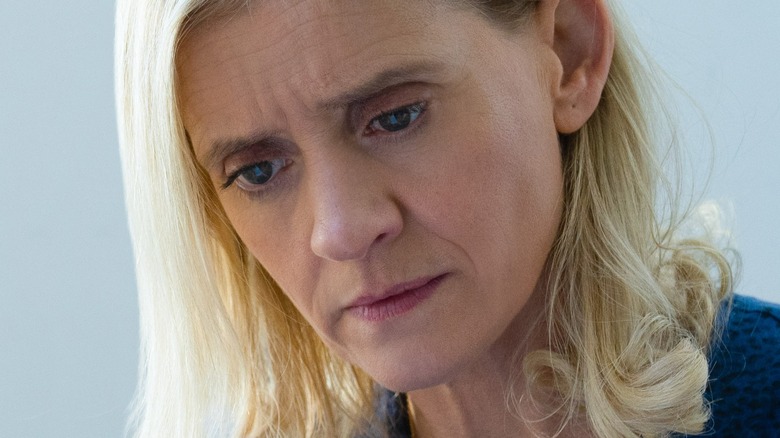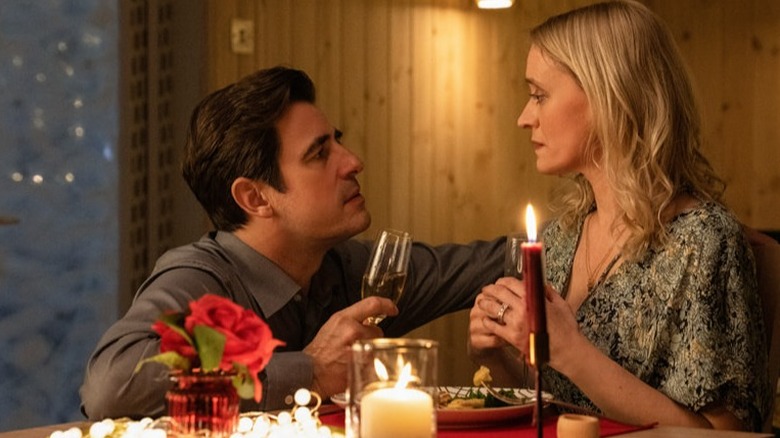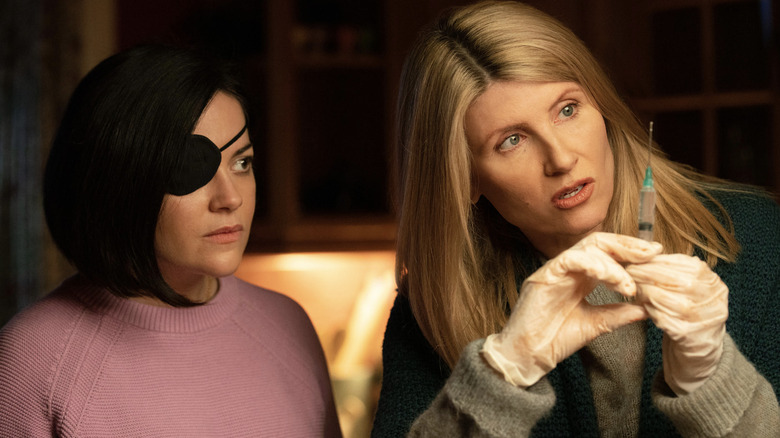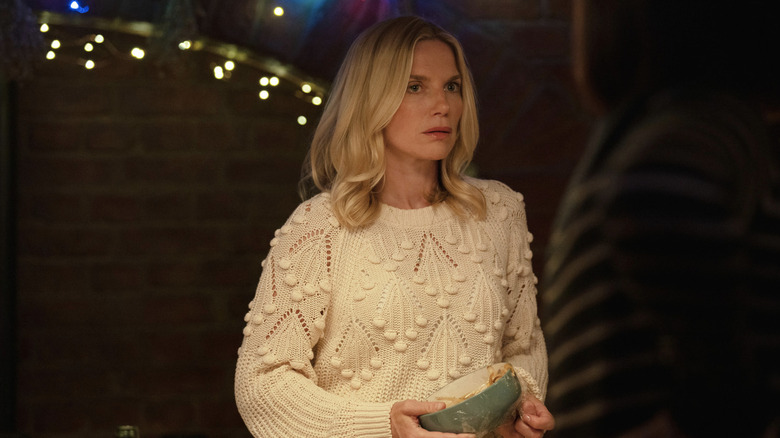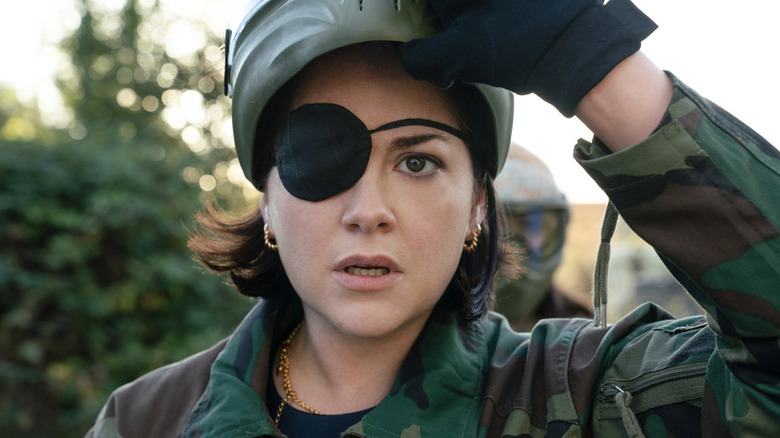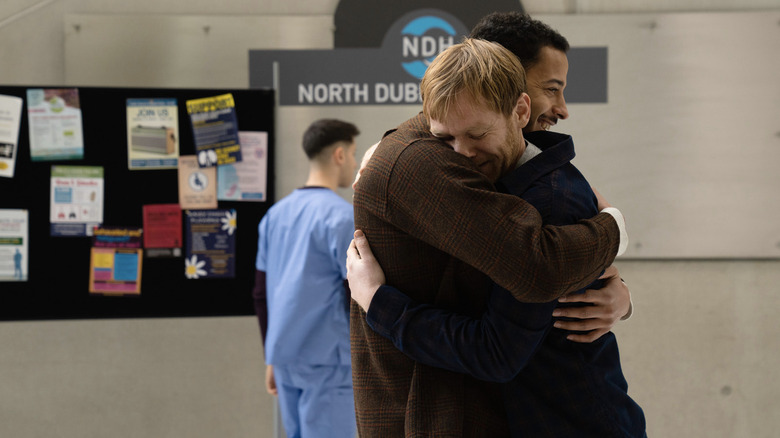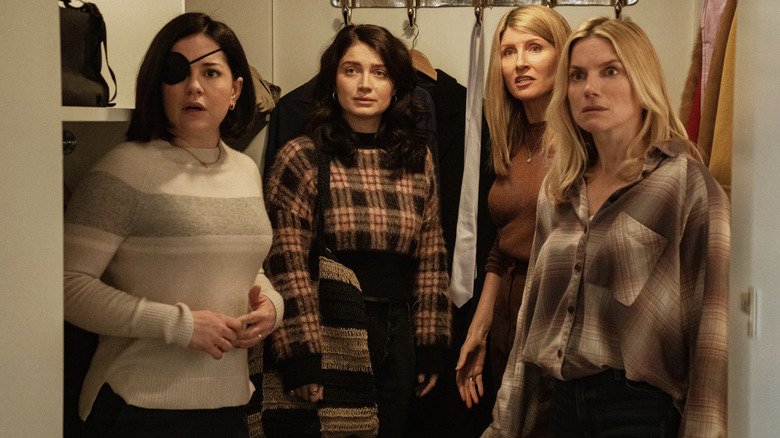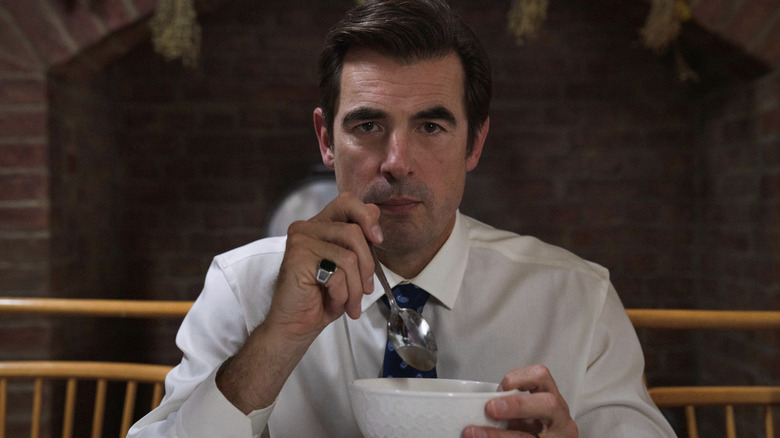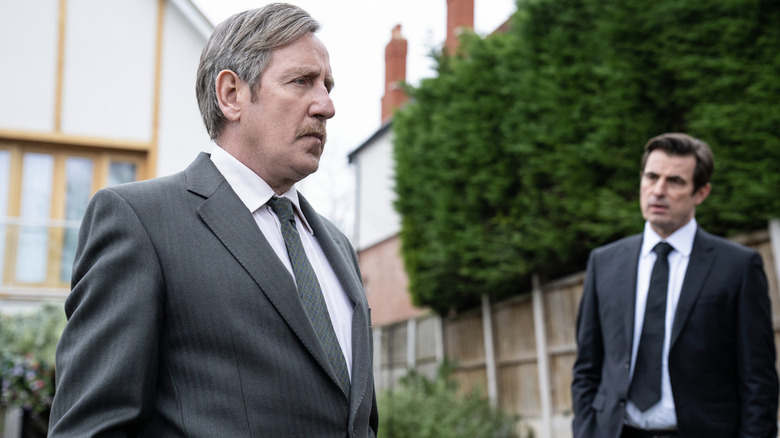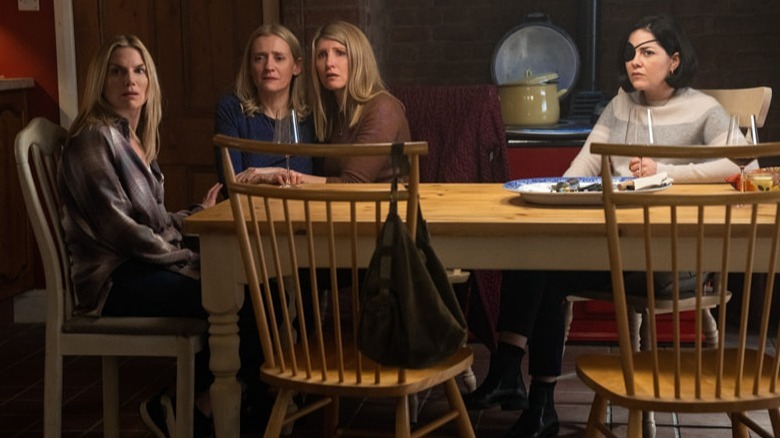The Ending Of Bad Sisters Explained
John Paul is dead. Finally. Or, as Bibi so elegantly puts it, "Ding-dong, the prick is dead." Well, audiences knew that John Paul would die from the series's first scene but no one knew how he would die, which kept "Bad Sisters" fans on their toes throughout the entire season. Now, the end is here and justice has dealt her unbelievably cathartic swift blow to JP's neck. Truly, it's difficult to remember ever wanting another character to die as much as the internet was rooting for the gruesome murder of JP.
The Irish show "Bad Sisters" is an adaptation of a Belgian series "Clan" which was developed for Apple TV by the brilliant Sharon Horgan ("Catastrophe") along with writers Brett Baer and Dave Finkel. The series echoes HBO's "Big Little Lies" as a clever, dark comedy that follows five sisters in their quest to kill their diabolical brother-in-law. Even so, the Dublin setting for "Bad Sisters" was an essential part of grounding the show in a more comedic, sibling-focused reality, as Sharon Horgan explained to GQ. The creative director for Apple TV UK, Jay Hunt, actually called Horgan asking her if she'd be interested in bringing the show to an English-speaking audience. Clearly the right choice.
If Claes Bang's portrayal of John Paul Williams occasionally dips into the cartoonishly evil, it only serves to keep the series feeling lighthearted and ensures viewers' continuous desire for his death. So far, reviewers have praised the comedy for its amazing cast and clever premise, proving that audiences are happy to engage in the guilty pleasure of joyfully wishing for a murder.
Grace gets her moment
Even though Grace (Anne-Marie Duff) is the main character in "Bad Sisters," there's not much audiences know about who she is as a person beyond being the timid wife of John Paul. Her relationship with JP has ground her down so much that she's unable to even participate in a dance class, her self-confidence stripped away by years of abuse.
Finally, in Episode 10, Grace comes alive. JP reveals that he slept with Eva, accusing her of seducing him. Grace, who we now discover is an astute woman, realizes JP actually assaulted Eva. She takes matters into her own hands, strangling John Paul with his pajama bottoms on the night of her birthday, smartly burying him in the murder weapon. The possibility of Grace being JP's killer has been a popular fan theory since Episode 1.
Yet there are more revelations to come. At the end of the episode, Grace thanks Roger (Michael Smiley) for his help, and the scene flashes back to JP's death, showing Roger and Grace working together to position JP's body, a fact that she doesn't share with her sisters. Could there be romance in their future if it goes to Season 2? The chemistry between them throughout Season 1 does imply there could be something there.
Viewers are also left to wonder, did Grace already have the murder planned? The red yarn for the scarf and the DVD copy of "Isadora" was already at the cabin and queued up as she knitted on the sofa. Incidentally, Isadora Duncan was a real woman — a dancer who was killed when her scarf became tangled in the wheel of a car.
Eva's reasons for killing JP
Eva, played by creator and executive producer Sharon Horgan, is the matriarch of the Garvey girls, the leader of the inept murderous plot, and, as audiences discover in Episode 10, the one who might have the biggest reason to hate JP. Eva was sexually assaulted by John Paul ten years earlier.
John Paul's revelation that Eva seduced him, obviously a lie, leads to his demise (thankfully). However, Eva's retelling of the event to her sisters is easily the most emotional scene of the entire series. The fact that the assault most likely contributed to her subsequent miscarriage throws a harsh light on JP's comments about her infertility and his insults about her being "frigid." The disclosure of what happened ten years prior explains Eva's willingness to go along with Bibi's plans and JP's fixation on her. It also brings a disturbing note to the scene in Episode 8, where Gabriel (Assaad Bouab) confronts Eva about her relationship with JP, believing they might have feelings for each other. He tells her, "You say you hate him, but sometimes it seems to me like there's something else."
Yet, the writers bring their sharp wit to even the most dramatic moments, as evidenced when Ursula says to the sisters, "Surely we just explain what he did, the rape, the abuse, he's pushed us all over the edge." Eva responds sarcastically, "Oh yeah, 'cause that always works for women."
If you or anyone you know has been a victim of sexual assault, help is available. Visit the Rape, Abuse & Incest National Network website or contact RAINN's National Helpline at 1-800-656-HOPE (4673).
There still a mystery for Ursula
Episode 10 sees the end of Ursula (Eva Birthistle) and Ben's (Peter Coonan) steamy affair. During the past year, John Paul had made it his special mission to torment the lovers, catfishing Ursula for nude photographs and threatening to reveal the romance to Donal (Jonjo O'Neill), Ursula's husband.
Ben, at one point, was a likely suspect as JP's killer, roughing him up one night after learning what he did to Ursula. However, there's a mystery around the pair that might leave fans wondering. During Episode 10, Ursula speaks with Ben, and audiences now understand that the couple is no longer together. Ben cryptically says to her, "It repulsed me what you asked me to do that night."
Here's the thing: during the night in question in Episode 8, when the pair are in bed, Ursula only says to him, "I wish he'd leave us alone. Without him, we could go back to the way we were." Hardly a gruesome request.
So, what's he talking about? Perhaps something else to be answered in a Season 2 — if there is one.
Bibi learns to love
Out of all the sisters, the relentlessly uncompromising Bibi, portrayed by Sarah Greene, seemed like the one who'd finally manage to get JP, especially with her sharpshooting and archery skills — after all, who can forget the watermelon scenes? Grace, with all her softness and motherliness (and JP's vomit-inducing nickname for her, Mammy), didn't ever really seem like she had the nerve, at least not until the very end. However, the writers of "Bad Sisters" pulled off a clever reversal, subverting audience expectations while giving both characters the space to grow.
When "Bad Sisters" ends, Grace is laughing with her sisters and is shown to be a vibrant woman who's able to reclaim her sense of self. Bibi, on the other, reaches out for an "involuntary hug" (as Eva calls it), embracing her sister with a gentleness and empathy that was not seen in earlier episodes.
Becca has to forgive herself
Baby Becka, the youngest of the Garvey sisters, is played by Eve Hewson (who also happens to be Bono's daughter). The most impulsive of the five sisters, Becka's friendship with Minna, JP's unconventional mother, gave her an odd connection to her villainous brother-in-law. When Becka accidentally locks Minna (Nina Norén) in a freezer instead of JP, she drunkenly shouts about her guilt at a few police, endangering all the sisters.
In the final episode, Becka's occasional lover and insurance investigator, Matt (Daryl McCormack), discovers that Grace is the one who killed JP. Driven by her guilt over Minna's death and what she believes is her failure to kill John Paul weeks earlier, Becka takes drastic measures. She tries to convince Matt that she murdered JP and spikes a drink with the leftover pentobarbital, but that doesn't work. It isn't clear whether Becka thought about giving the drink to Matt first, but either way, she starts to drink the poison, only being stopped because Eva and her sisters arrive, preventing her.
Becka's love for Matt offers the resolution, the way out for all the characters in the end. Matt cannot turn in the Garvey sisters because of his feelings for Becka, and Becka finally begins to forgive herself for the accidental death of her friend, Minna.
There's finally peace for the brothers
Rather than a competent constable investigating JP's death, "Bad Sisters" instead has the generally incompetent Claffin brothers provide that "Could they go to prison" tension. Thomas Claffin, played by Brian Gleeson, is obnoxious and more than a little desperate, clutching onto JP's death to save himself. Matthew Claffin is his skeptical half-brother thrust into the whole situation against his will.
In the "Bad Sister" season finale, Matt finds the evidence against Grace in the red yarn and "Isadora" DVD, breaking into the cabin and digging through the trash on the living room floor. For most of the season, it's difficult to imagine why anyone would answer the questions of two insurance men without legal standing. Either way, their bumbling attempts at being amateur detectives provide plenty of comedic fodder.
Still, there is one bit of foreshadowing that Matt gives the audience. During his interview with Roger, Matt asks whether he was there at the cabin the night John Paul died. Roger, we learn later, went back after JP's death to help Grace with the body. It's unclear whether Matt knows what Roger's done, but he certainly has some suspicions, leading to another loose thread if there is a Season 2.
Siblings have the strongest bond
"Bad Sisters" gives a pretty good picture of its central theme from the title, and it fulfills its promise by the final episode. In the finale, audiences finally see Grace snap, killing her husband in a moment of satisfying justice, but Grace doesn't kill John Paul for herself. It's not her suffering that seems to send her over the edge.
Rather, the catalyst for JP's downfall is his confession to Grace about what he did to Eva. Even though JP claims Eva seduced him because she was drunk, this attack against her sister prompts Grace to act. Eva has always been the protector of the family, the one who took care of them after the death of their parents, but "Bad Sisters" reverses this situation in the end. It's scared, timid, quiet Grace who kills John Paul, avenging her sister and removing a monster from their lives.
Similarly, it's not a detective that catches the sisters out in the end, it's another pair of siblings — the down-and-out Claffin brothers. Just as the Garvey sisters are working out their issues, Matt and Thomas must deal with the suicide of their father and their strained relationship as half-brothers. Ultimately, Matt forgives Thomas for keeping the means of their father's death a secret, delivering their salvation in a deal with the Garvey sisters after learning about who really killed JP.
If you or anyone you know is having suicidal thoughts, please call the National Suicide Prevention Lifeline by dialing 988 or by calling 1-800-273-TALK (8255).
The realistic portrayal of domestic abuse
It's incredibly challenging to portray the realities of an abusive relationship in cinema, and sadly some directors and producers choose to show domestic abuse as gratuitous violence. However, "Bad Sisters" is one of the few shows able to give an accurate picture of domestic abuse in a way that feels empathetic towards victims and doesn't rely on tired tropes. While JP is clearly abusive towards Grace, it's a remarkably subtle and insidious type of abuse, as he relies on manipulation, gaslighting, and verbal abuse to control her.
Watching John Paul tear down his wife and belittle her is unsettling as a viewer, as is seeing how JP is often able to make her doubt herself and her version of events. Yet, executive producer Sharon Horgan was aware of the traps many filmmakers fall into when trying to portray abuse and has managed to avoid them. On "Late Night with Seth Meyers," Horgan spoke about the complexity of the situation, explaining, "There's an abusive domestic relationship at the heart of it, and that's a lot of responsibility ... to tell a story like that and to make it truthful and show the brutality of it, but at the same time its a comedy drama and he's a clown and a fool."
In one of the most powerful moments of Episode 10, Grace collapses on the bed after strangling JP, crying, "You blamed me. You made me think it was me. You f***ing monster."
If you or someone you know is dealing with domestic abuse, you can call the National Domestic Violence Hotline at 1−800−799−7233. You can also find more information, resources, and support at their website.
Learning how to forgive
It seems odd that a show about the gruesome murder of an abusive man could also have forgiveness as one of its central themes, but "Bad Sisters" seems more than happy to be unconventional. Families, even the best ones, are capable of hiding secrets and hurting each other. Within the world of the Garvey sisters, forgiveness is often necessary.
Throughout the series, several characters search for forgiveness. The most notable is Becka, who accidentally kills Minna after locking her in the freezer. Becka is so devastated by Minna's death that she tries to accept responsibility for JP's murder until Eva begs her to let it go, saying, "Whatever happens next, you have to forgive yourself. You have to." It's a lovely moment between the sisters that calls back to Becka's conversation with Matt, where she encourages him to forgive Thomas.
However, one of the best moments of forgiveness in "Bad Sisters" is given to Roger when he drives to the cabin and tells JP, without any anger, that he has forgiven JP for turning him in to the police. Here's the brilliant moment, though — JP rejects his kindness towards him, saying, "Forgiveness flows down. Remember that." Roger undoubtedly remembers it as he helps Grace commit murder.
Sharon Horgan has some thoughts
The brilliant thing about "Bad Sisters" is that it isn't entirely a "whodunnit" since viewers know from the get-go that pretty much everyone wants JP to die. Instead, "Bad Sisters" is more a "how done it" according to Sharon Horgan, that is. Whatever the producers decide to call it, the plot works.
To achieve the show's sense of dread mixed with comedy, Horgan and the crew looked to a famous film for inspiration, telling GQ, "We used to reference 'Fargo' (the TV series) quite a lot, in terms of the style of humour with dark drama. And the way you can have larger-than-life kind of characters come in and out of that. You need to feel sort of menaced by it, but also be allowed to just laugh at a ridiculous character."
Another aspect of "Bad Sisters" that just works is the fantastic bond sisters have. How did the cast manage to achieve that sibling feeling for the series? Well, the five main actresses spent over a week in rehearsals and were able to build a relationship during that time. Oh, and apparently, jumping into freezing cold water together will also bring a group of people close. One of the central locations for "Bad Sisters" was Dublin's famous Forty Foot Drop, where the cast spent more than one morning going for a cold swim.
Will there be a Season 2?
For now, we're not sure. "Bad Sisters" was announced as a limited series, and Apple TV hasn't released any information about whether the show will continue. To be fair, it does beg the question — who would die next? According to Sharon Horgan, "The sisters are so great together, and it's such a fun premise that you think something could happen," she told "This Morning." So, it is possible that the Garvey sisters could return.
Luckily, Sharon Horgan isn't the only one from the show who's thought about coming back for more murder and sibling mayhem. Saise Quinn (also known as Saise Ni Chuinn), who plays Blanaid, Grace and JP's daughter, was ready for round two of the show at the series premiere, telling HELLO! that she believes her character's relationship with "Grace can definitely develop further." Perhaps with the cast's blessing, audiences will be seeing more of the Garvey sisters.
Beyond that, there are a few mysteries still left unsolved by the end of Episode 10. As Grace discovers John Paul's pornography habit and his harassment of Roger, she continues to pull files out of the drawers. At the same time, the camera pans out, leaving the audience wondering if JP has more secrets to be revealed.
